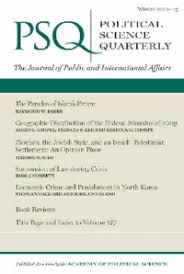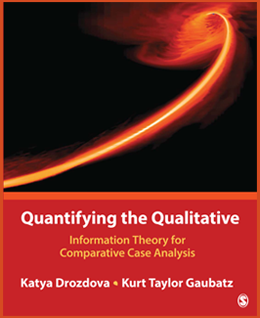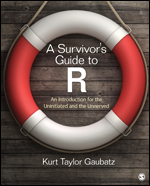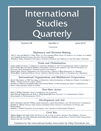
Research Overview
My primary research focus is on the relationship between domestic politics and international relations. The bulk of my work falls into three broad and interconnected categories: the relationship between regime type and international relations, the impact on international relations of the strategic behavior of domestic politicians who must balance domestic and international incentives, and the relationship between democratic politics and international law. In this overview of my current work and future research plans I outline the nature of my efforts in each of these areas.
The Intersection of Domestic and International Politics
First, I have contributed to the burgeoning literature on the distinctive behavior of democratic states in international relations. In my book, Elections and War, and my 1991 Journal of Conflict Resolution article, "Election Cycles and War," I look at the relationship between democratic electoral politics and the decision to go to war. The central result is an empirical demonstration that over the past two centuries democratic states have generally managed to avoid getting into wars in the period just prior to an election. In my 1996 International Organization article on "Democracy and Commitment in International Relations," I review several factors that affect the ability of democratic polities to enter into credible international commitments. In one of the earliest uses of hazard modeling in political science, I show that alliances between democratic states have been longer lasting than mixed alliances or alliances between non-democracies.
This body of work also fits into the growing literature on strategic politicians and international relations. The strategic politicians literature reflects an attempt to build microfoundations for international relations on the incentives faced by individual political actors who make foreign policy decisions with an eye toward maximizing their power within the domestic setting. This literature is often connected to the literature on democracies and international relations in that the transparency of democratic processes makes democratic states an effective laboratory for the study of domestic political incentives more generally.
Most of the earlier work in the domestic politics approach to international relations has focused on the internal processes whereby foreign policy choices get made. My work goes beyond this earlier literature in that I more explicitly incorporate the interaction of domestic and international politics. This characteristic of my work is well represented in "None Dare Call it Reason" (1998) in which I link together a formal model of voting behavior at the domestic level with a formal model of deterrence politics at the international level. This linkage allows me recreate and then analyze the interactive incentives faced by politicians who must choose policies that simultaneously affect both their prospects for election and the probability of war. Another work in this vein is my International Interactions article, "Political Competition and Foreign Policy Sharing," in which I look at the incentives leaders have to share power over foreign policy in a simple three-actor model. I have recently expanded on this modeling effort to develop a predictive model of electoral attention to foreign policy. In "Elections and Foreign Policy" I show that a significant portion of the variance in the attention that American presidential candidates pay to international issues can be predicted with reference to just three independent variables: party affiliation, the so-called "misery index," and the density of American involvement in international crises.
International Law
My focus on the relationship between democracy and international relations has led to a broad interest in the connections between democracy and international law. This work emerges both from my teaching interest in international law, and from a belief that international law is an understudied normative system in international relations. My overarching interest within this area is in the effect of internal democracy on the ability of states to enter into international commitments and build legal institutions at the international level. The fundamental issue that drives my work on international law is the idea that it is conceptually useful to think of at least two different kinds of international law at work in the world today. First, there is the traditional law that sets out a minimum set of standards for the behavior of rival states in an anarchic world. Second, there is a progressive area of law that sets out standards for relations between states that have the ability to enter into more credible commitments. This connects to my interest in democracy in that, as I have argued in my article on democratic states and commitment in international relations, democratic states have particular institutional advantages for making international commitments.
This theme appears in my Michigan Journal of International Law article "How International is International Law?" (written with a Stanford graduate student, Matthew MacArthur). In this piece we document the extreme Western domination of legal practice before the International Court of Justice (ICJ). We show that Western states use their own staff lawyers when they go before the ICJ, while non-Western states tend to be represented by private international lawyers from a handful of Western countries. We argue that these biases suggest limitations in the degree to which international law has been diffused across the international system.
In my work on the law of armed conflict I am working to show how the law is weakened by attempts to apply legal models from a world of credible commitments and verifiable behaviors to an area that by definition involves minimal trust. My draft article on changing interests and persistent rules chronicles the changing incentives for the protection of non-combatants in war. I argue that there is a gap between the kinds of rules that have been developed in this area and the underlying structure of incentives to comply with the emerging rules. This draft comes from a larger book project in which I use a game-theoretic construction to describe four kinds of incentive structures in the law of armed conflict, and show how a lack of correspondence between the rules and the underlying incentive structures can undermine legal principles.
A new project that is still at the working paper stage is an attempt to think about the application of voting models to the analysis of democratic principles in international organizations.The first piece in this effort, is an inquiry into the attitude of democratic states toward the norm of sovereign equality in international organizations. In the larger project, I explore the practical and philosophical problems created by the increasing dominance of liberal democratic norms in a world of states that are still largely illiberal domestically and in which the most prevalent decision-making norm in current international organizations is what I call "sovereign democracy" -- the one-state-one-vote system.
American Foreign Policy
Finally, there are two characteristics of my intellectual approach to international relations that deserve mention. The first is that I have brought to my work strong competence in the subfields of American politics and political philosophy. The former is suggested by my work on electoral dynamics and war, and by my work on public opinion analysis. My 1995 World Politics article, "Intervention and Intransitivity," is an application of the social choice literature to the analysis of public opinion. A new paper, in draft form, expands on that project using public opinion concerning American intervention in the Bosnia imbroglio. I argue that the timing of polls has an impact on the measurement of public opinion, and then show how different kinds of events motivate the media to conduct polls. Polling is itself clearly an important political activity that has an impact on both domestic and foreign policies. Yet, to my knowledge, this is the first systematic analysis in which the activity of polling is treated as a dependent variable.
Political Philosophy
My interest in traditional political theory and international relations is evinced throughout my publications. My 1996 Journal of Democracy article explores the Kantian mechanisms for the expansion of democracy in light of the progress of democracy in the Twentieth Century. Similarly, in my 2002 article in Security Studies I use Hobbes' work on the problems of forming an effective polity as the basis for a discussion of the failure of traditional international relations theory to adequately consider the importance of the domestic incentives for state cohesion. Another current project that fits under this heading is an exploration of the variety of educational interpretations of the war between Athens and Sparta. This inquiry is broadly connected to my interests in the role of democracy as a source of state legitimacy. In this project I am looking at the myriad ways in which the Athens and Sparta story has been taught at the grade school and middle school level cross-culturally and in different historical periods. Using this comparative window, I demonstrate the strong influence cultural and political contexts have on the basic interpretation of historical events and philosophical ideas.
Statistics and Research Methods
The second characteristic of my intellectual approach is a long-standing interest in research methodologies. These interests led to a significant side project developing a comprehensive introduction to the use of the R language for computational statistics and statistical programming. A Survivor's Guide to R is available from SAGE press.
With my co-author Katya Drozdova, I have a piece in ISQ (2014) and a 2019 SAGE book (Quantifying the Qualitative) on the use of quantitative techniques from information theory to make the analysis of comparative case studies more systematic and rigorous.
Both the R book and the work on information theory in comparative case studies reflect an interest in making serious and systematic quantitative methods more accessible to a wide range of students, scholars, and practitioners.
As should be apparent, my intellectual approach to the field of international relations is characterized by significant methodological breadth. International relations scholarship has suffered for many years from methodological balkanization. Methodological battles have on occasion loomed larger than the substantive issues that should be our central focus. I believe I have contributed to lessening some of these divisions by effectively drawing on formal, quantitative, and case methods in my research, and by my interest in combining normative and empirical work.
Using this variety of methodologies, the common theme in my work has remained the search for a greater understanding of the connections between domestic, and particularly democratic, politics and international relations.

Recent Publications
 |
"Things Unspoken: The politics of forbidden discourse" (with Brandon Yoder & Rachel Schutte) Political Science Quarterly (Fall 2019) |
 |
Quantifying the Qualitative: Information theory for comparative case analysis (with Katya Drozdova) (SAGE 2016) |
 |
A Survivor's Guide to R: An introduction for the uninitiated and the unnerved (SAGE 2015) |
 |
"Reducing Uncertainty: Information analysis for comparative case studies" (with Katya Drozdova) International Studies Quarterly (2014) |
Current Work
I am currently finishing up a book draft that returns me to some of my roots in philosophy and theology. In this book, I make the provocative argument that women's equality is the most important idea in all history. The basic logic of the argument is that equality is essential to authentic partnership love, which, for most people, most of the time has been at the pinnacle of life purpose. Thus, women's equality makes achievement of this deep human aspiration possible for the first time in history. That surely makes it the most important idea of all time.
There are a number of other implications that follow, and that point towards particularly grave failings on the part of our science, philosophy, and religion.
More discussion of this turn in my research and writing agenda is available here on my blog.